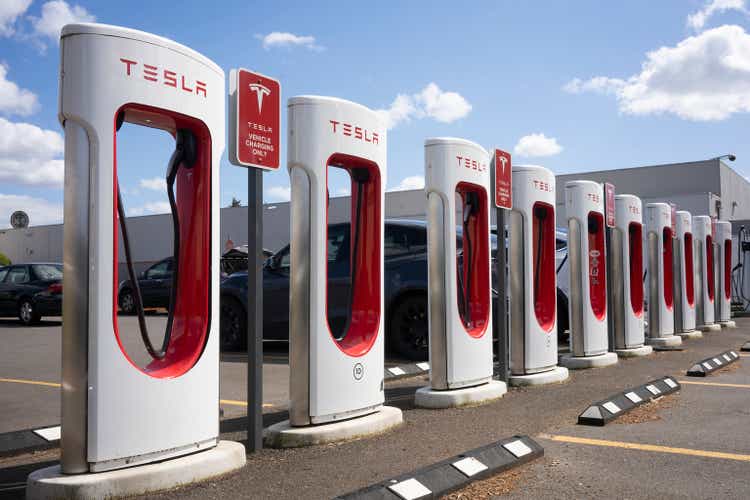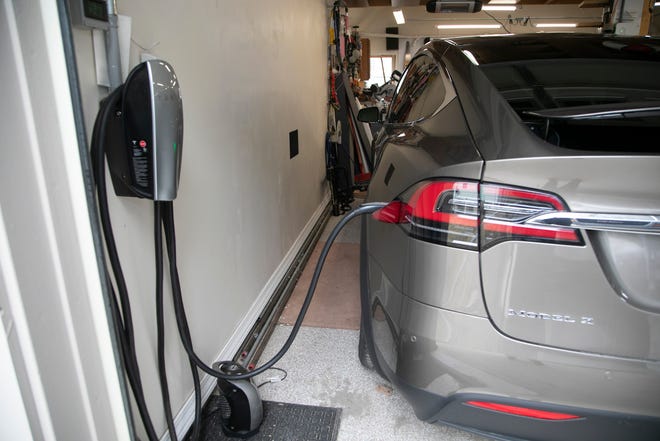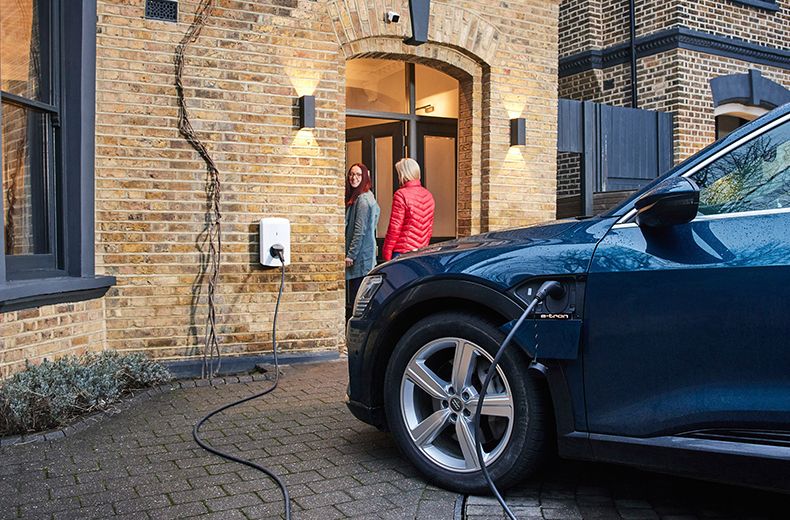
There are many advantages to electric vehicles over traditional ICE (internal combustion engines) vehicles. They are easy to charge and maintain, have a lower maintenance cost, and provide an exceptional driving experience. There are many different chargers for electric cars. Charge speed and rate vary depending on the battery type and technology. There are also many differences between charging stations, plug-in EV chargers, and other types of chargers.
The most popular chargers in America are the Level 2 and L2 chargers. These are commonly found in workplaces and public places. These charging systems can charge an EV's batteries in less than 20 minutes. Often, they are located near parking lots. They can be used for many purposes including overnight charging and adding more range. These chargers typically have a rating of 16 to 30 amps. They can be hardwired, or plug-in.

It is possible to charge your L2 battery at home with portable chargers. These chargers can be plugged into a standard 240-volt wall outlet. They can deliver up to ten miles of range per hour. A fast charger can be used to charge an EV’s battery upto 80 percent in 30 minutes. These chargers can be found in many public places but are much more expensive than the majority of EV chargers. They are less reliable and not as protected against the elements. They are also slower.
A home EVSE is another option. These units are installed in the house, but the home can also be adaptable to take a 240 volt unit. These units can be installed faster than Level 2 chargers. However, they are more difficult to install than Level 2. The amount of wire needed to support the equipment will affect its cost. The required amount of wire will depend on how many amps are needed. A good warranty is a must if you're thinking about this option. You may also find lower-quality units on the market. Be sure to check reviews before buying.
Some EV owners have discovered that they can charge their EVs at home. For those who don't want to spend the cash to purchase an EV, this is a great option. The average US household will pay 14 cents for each kilowatt-hour. That means they'll have to spend about half a $1 to charge their electric vehicle. This price can vary depending upon where the charger is located, and fuel costs in that area. Your energy bill will be reduced by using a time of use electricity plan. Ask your EV manufacturer about these plans.

These charging stations come with a variety sizes. These are able to deliver up to 40-amps to your vehicle. These chargers range in price from $400 to $700. However, these chargers are not very durable so should not be left unplugged. They can also be easily set on fire.
FAQ
What is the best career for an automotive mechanic?
The automotive industry is full of exciting opportunities for those who are dedicated to excellence. It is important to work hard and learn as much from others as you can in order to succeed in this industry.
You'll need to have excellent communication skills because you'll spend most of your time talking to customers and other employees. You should also be willing to travel and work long hours, making commuting difficult.
You can take classes at universities and community colleges if you are interested in a career as an automotive technician. Many schools offer programs specific to students interested in sales, auto repair, or customer service.
If you decide to pursue a degree, you should study mechanical engineering. You can get your bachelor's degree in as little as four years.
Many employers will also hire graduates straight from school. It's a smart idea to begin looking for work while you have the opportunity to study part-time.
After you've finished your education, it's likely that you'll need to go through some training before you can be hired as an auto technician.
This means that you must pass the Automotive Service Excellence exam. This test covers engine maintenance and brakes as well as suspension.
After passing the ASE exam, you can apply for a National Institute for Automotive Service Excellence license.
A license allows you to perform repairs on vehicles owned by private individuals. Based on the services rendered, you will receive compensation.
Not all states require licensing. You will need a license if you want to work in a different state.
Some states don't issue licenses until after completing a certain amount of training. This may be the case for you.
What are the requirements for an automobile technician?
You must have high school, or GED, and be able to read and write well in English and math. You also need to be able to read and write well. You will need to pass a written test and then go through a series of practical exams before being allowed to start work.
How can I prepare myself for a mechanic apprenticeship
It is essential to understand what you are getting into. You must understand the workings of cars. This way, you know where to start when you go on your first day at the garage.
You should also know how to fix common problems such as tires or broken lights.
This will teach you how to diagnose problems and fix them yourself.
Also, it is important to know how parts fit together so that you can put them back together.
Finally, it is important to know how tools can be used safely and efficiently.
All these aspects will help you become a competent technician.
How can I fix my automobile as a hobby.
If you are interested in cars, why not take it on as a hobby? You can learn to fix them, buy them parts, and even sell them. If you are looking for something more, it would be an excellent hobby.
It's not an easy task to make this a full-time job. It requires a lot of hard work and dedication. It will also require a large amount of investment.
It is best to avoid getting involved in car accidents unless you have good reasons.
What should I know about car mechanics
To be an auto mechanic, you don't have to know much about cars. It's enough to know how to fix things. This is why most people get started with simple jobs such as changing brake pads or tires. Then they move on to more difficult repairs.
It is important to be able to read and understand diagrams as well as written instructions. You'll also need to be able to judge whether parts need replacing or repairing.
It is important to understand that vehicle repairs should only be attempted by those who have received the proper training. This is especially important if you work with expensive parts such as transmissions or engines.
Although you won't be required to know much about cars you should have a solid understanding of the fundamentals and principles of mechanical engineering. This means understanding the principles behind how engines work and how brakes function.
You should also be ready to handle all kinds of situations. For instance, you might find yourself in charge of a vehicle that has been in a serious accident. You will also need to be able to deal with accidents and breakdowns.
Finally, you must be willing to learn new skills quickly. You will need to be able not only to diagnose problems but also to perform simple maintenance tasks like tightening bolts and nuts.
What qualifications do I need to be a truck mechanic?
You don't have formal qualifications for this role, but you are very experienced working on trucks and engines. Your knowledge is valuable as you are able to quickly diagnose problems and work efficiently.
You also have an excellent knowledge of diesel technology which will help you to understand what parts are needed to repair our vehicles.
What qualifications are required to become a mechanic
To become a mechanic, you'll need to pass a series of exams. These exams include:
-
A general knowledge assessment
-
A practical exam
-
An apprenticeship test
These tests are designed for you to understand the basic concepts and principles of mechanics before your start as a technician.
Once you pass these tests you can become a mechanic. But, you will still need an apprenticeship. This will involve training in the trade.
To fully understand the mechanics of vehicle repairs, you'll need workshops and classes. Experienced mechanics will also be required.
You'll need a high level of concentration and attention to detail if you want to succeed as a mechanic. Vehicle repairs require you to be very attentive.
To become a successful mechanic you'll need patience. If you don’t love to follow instructions, this may not the right career path.
If you enjoy cars and fixing them, this job could be a good fit for you.
Statistics
- 52% of Mechanics in the United States think their salaries are enough for the cost of living in their area. (indeed.com)
- The U.S. Bureau of Labor Statistics (BLS) reports that the job outlook for automotive service technicians and mechanics is expected to decline by 4% from 2019 to 2029. (indeed.com)
- There were 749,900 jobs available for automotive service technicians and mechanics in 2016, which is expected to grow by six percent through 2026. (jobhero.com)
External Links
How To
How to set up a business plan for a car repair shop
Before you start anything, you should have a good grasp of the basics of starting a business. First, you need to decide what kind of business you want to start. Start your business in a small, isolated town. If things don't go according to plan, you won’t have to look hard for another job. If you decide to open your own auto repair shop, then you'll probably want to choose a location near a large population base. Customers will be more likely to visit you if they have problems. You can also sell parts at very low prices to them.
Franchise opportunities are a great option when you're just starting out. Franchises require less capital investment to open than traditional businesses. You still need to pay monthly royalties and fees to franchisors. It is important to be cautious when choosing a franchise. They may promise big returns, but never deliver.
If you already have experience working in retail, then you could try running your own auto repair shop. Many who own their own businesses agree that it was the best decision they made. You must still create a business plan before starting. You should write down all the goals you want for your business. Some examples of goals might be increasing sales, customer service and lowering costs. These goals can be written down and you can start looking for ways to reach them.
You may be interested in opening an auto shop. Next, you will need to find out how to finance it. For funding their businesses, many people borrow money at banks and credit unions. Banks will typically require collateral. That means you have to provide something of value as security. People may even be able to borrow against their homes. You will need to demonstrate that you have sufficient cash flow for the loan repayments to qualify for a loan.
Once you have raised capital for your business you will need to apply for a license. There are several types of licenses that you can obtain depending on what kind of business you want to operate. For instance, auto mechanics will need a state license. Body shops only require a Federal license.
A marketing strategy is the last thing you need. Before you start advertising, you'll need to determine exactly what you want your company to stand for. What sets your business apart from other businesses? How can your business improve on the work of others? These questions are all part of developing a strong brand identity. With this information you will be better equipped to design engaging advertisements.